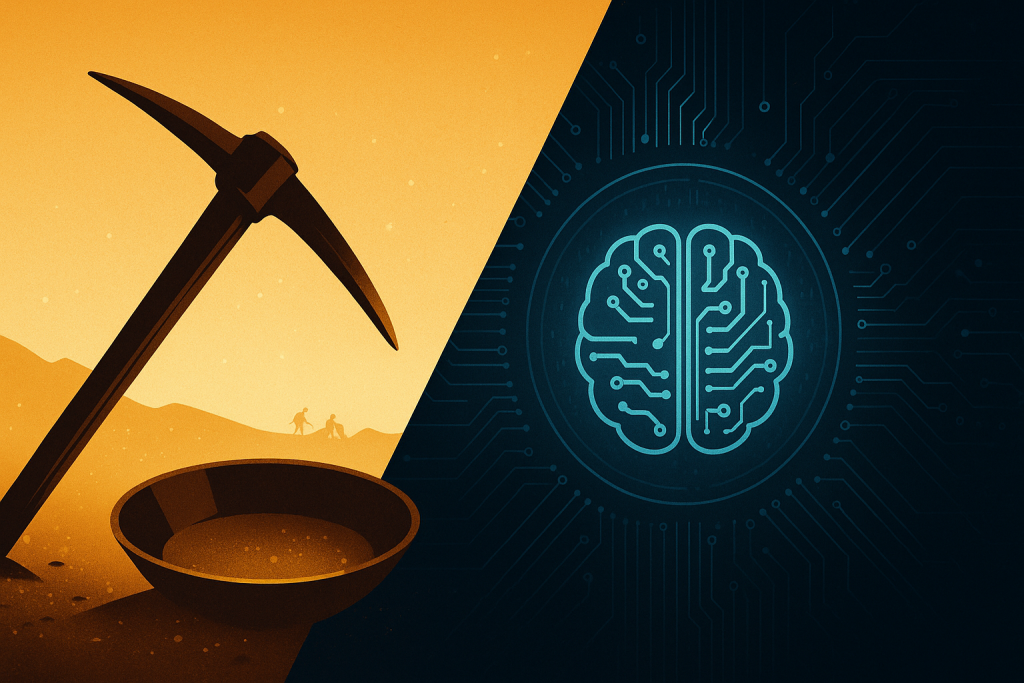
-
How Technology ruined humanity
I have spent a lot of time and effort in the last few months to highlight numerous issues with AI, which…
-
AI is An Ephemeral conceptual triumph & an enormous waste in real life
I keep writing about AI for the simple reason that it’s so complex and different from any other technology in human…
-
AI Will Need More Workers, Not Less
I am sure everyone has by now, read at least a single article about how AI is going to decimate the…
-
Does AI have a future?
No, the title is not a joke. But I am sure to most readers it looks like it is because AI…
-
Rush to AI has the fever of the gold rush – but where is the gold?
The current rush to AI is not just spectacular, it’s also spectacularly misguided. you Rush to grab money When there is…
-
A Computer is an unthinking, uncaring Machine. Are you the same?
Welcome to Our Blog Stay updated with expert insights, advice, and stories. Discover valuable content to keep you informed, inspired, and…
-
AI, the new GOD or an ungodly scam?
AI is everywhere. I am sure people are now organizing introductory classes in kindergartens because the future generation has to be…
-
Why Architecture Maturity Assessment?
Do we need yet another framework in IT (Information Technology)? Isn’t there a plethora of them already? That’s a good question,…
-
Are We Witnessing The End Of Applications?
I recently worked at a fintech company that has been in business long before “fintech” was invented. So, the company was…
No, the title is not a joke. But I am sure to most readers it looks like it is because AI is literally a new God in conceptual terms or a new Gold rush in economic terms or a combination of the two, that’s how it’s portrayed in the media today.
If you asked the question a serious tech bro, he/she may assure you that the future is “singularity”, whatever that means. This is not the kind of future I mean.
I have written a few blogs by now arguing in general against the crazy hype of AI, not necessarily against AI itself. So far, I have argued against AI on logical and philosophical principles, which resulted in me calling it “fake AI”. But the word “fake” has very negative political connotations today as it has become a favorite term of the (extreme) right wing. So I am going to drop it and use a less political term “false”.
I will refer to today’s AI as “false AI” because it lacks consciousness, understanding, and will, and it doesn’t appear that it can acquire any or all of these in the future using its current technology.
AI is computing as I stated previously. Computing has tree well defined stages:
- Input
- Algorithm application to the input
- Output
AI has hit limits on all three stages, and therefore, AI today is as good as it’s going to get if it survives all the challenges below.
No More data
AI has already consumed all the data available in the world. In fact, it consumed even the “unavailable” copyrighted data (see below) without paying for it. There is no more data available for consuming other than the AI-produced data, which causes AI “hallucinations” and is therefore useless. Input dead end.
Copyrighted data
This data has already been consumed, illegaly. The courts will decide whether AI can exist with this data at all going forward or whether it needs to spit it out, in which case nobody knows how to go about that. Or possibly AI companies can pay tens of billions in copyright fees. But they are losing money by billions as it is, where are they going to get the money?
The above sums up the input restrictions which alone would threaten any growing business. But for AI this is just the beginning.
Questionable & legally liable output
Output quality is the weakest part of the AI. Fortunately for it, the legal ramifications of this have so far been non-existent. But that will surely change in the future as more errors and more serious errors are made by AI. Who is going to be liable for this?
ELECTRICITY & WATER Shortages
Wired magazine predicted that at current growth the AI will run out of electric power by 2030, meaning it will consume all electric power available, leaving consumers with no power at all across the globe. Hence, in this scenario you cannot turn on light at home because AI is consuming all of it. This is not realistic, you will have power at home but your corporate AI will not. And let’s not forget water, the world is running out of water, and here we have a new gigantic water consumer with an insatiable appetite.
Cash Crunch
Currently, AI exist only because companies from OpenAI, Microsoft to Nvidia and all the others in between spent tens of billions with no paying customers (free ChatGPT and $20 for unlimited use). They are simply not willing to give up on a losing investment, hoping there is a gold pot at the end of the rainbow. But based on the above considerations, it’s simply not unrealistic.
Hence in the future all these rich tech lords will have to decide how much is too much. So far they are behaving like herded sheep, just repeating the same pattern, throwing good money after bad.
But smart money investors are starting to recognize the destructive pattern at work. Ray Dalio has warned for years that there isn’t much value in AI for business. AI is spectacular as a POC for a Turing test, confirming that computers have reached a stage where in actual conversation a computer performs as well as an average human. But this singular achievement cannot be easily monetized. Otherwise companies could simply hire people from the street and achieve income and profit growth based on the idea that an average human is a highly valuable asset to the company.
Yet, everybody understands that this is nonsense, so why can’t the same logic be applied to the AI? AI may talk like a smart bloke on the street, but that doesn’t make it commercially useful. The bloke is literate, very literate, but has no common sense and is generally an idiot savant. It takes a lot of work to socialize and monetize AI, and it must be done in baby steps. Talk is cheap, action is expensive, and a bad action is disastrously so.
I want to finish by comparing AI to another business craze from 10 – 15 years ago. As the oil was running out in the US (not the rest of the world), the always clever US investors threw money at the new drilling methodology, and soon their desire to out-drill others came to fruition. The so-called fracking, drilling at an angle in stone, proved miraculous. They could extract oil from stone. A truly mind-boggling achievement in scientific terms. But it turned out to be huge money-loser for the industry. Why so? Because drilling into stone costs a lot of money, becasue you need all this super-modern technology. But each and every drill has very limited and short lifespan. While the oil gushes out initially, like with the classic oil wells, it quickly turns into a dribble. The enormous pressure in the stone dissipates very quickly with each drill, and oil stops flowing. This basic physical condition caused the loss of anywhere from 0.5 trillion to a trillion+ dollars in investment. It’s not that there was something wrong with the oil, this technique made the US again the top global producer of oil. But the fracking was not a good value. The investors poured money into hoping they had discovered new Saudi-like oil fields, only to realize that these rock-based oil fields behaved nothing like oil lakes in the Saudi desert.
AI Will Survive but challenges remain
To answer the question I started with, it’s hard to imagine AI going away even though currently it’s a money-losing business proposition in general when not done correctly and there isn’t enough maturity in the business yet to figure out how to do it correctly.
Yet, as history proves, the hype will prove irresistible to many especially while AI is given away for free. Billions will be lost. Eventually, reality will kick in, the AI Robin Hoods will be transformed into hard capitalists and charge fair value for their service. This will divide the potential customers into those who truly believe in it and those who reconsider. And by that time, there actually may be proven methods and techniques of harnessing AI to deliver value.


Leave a Reply